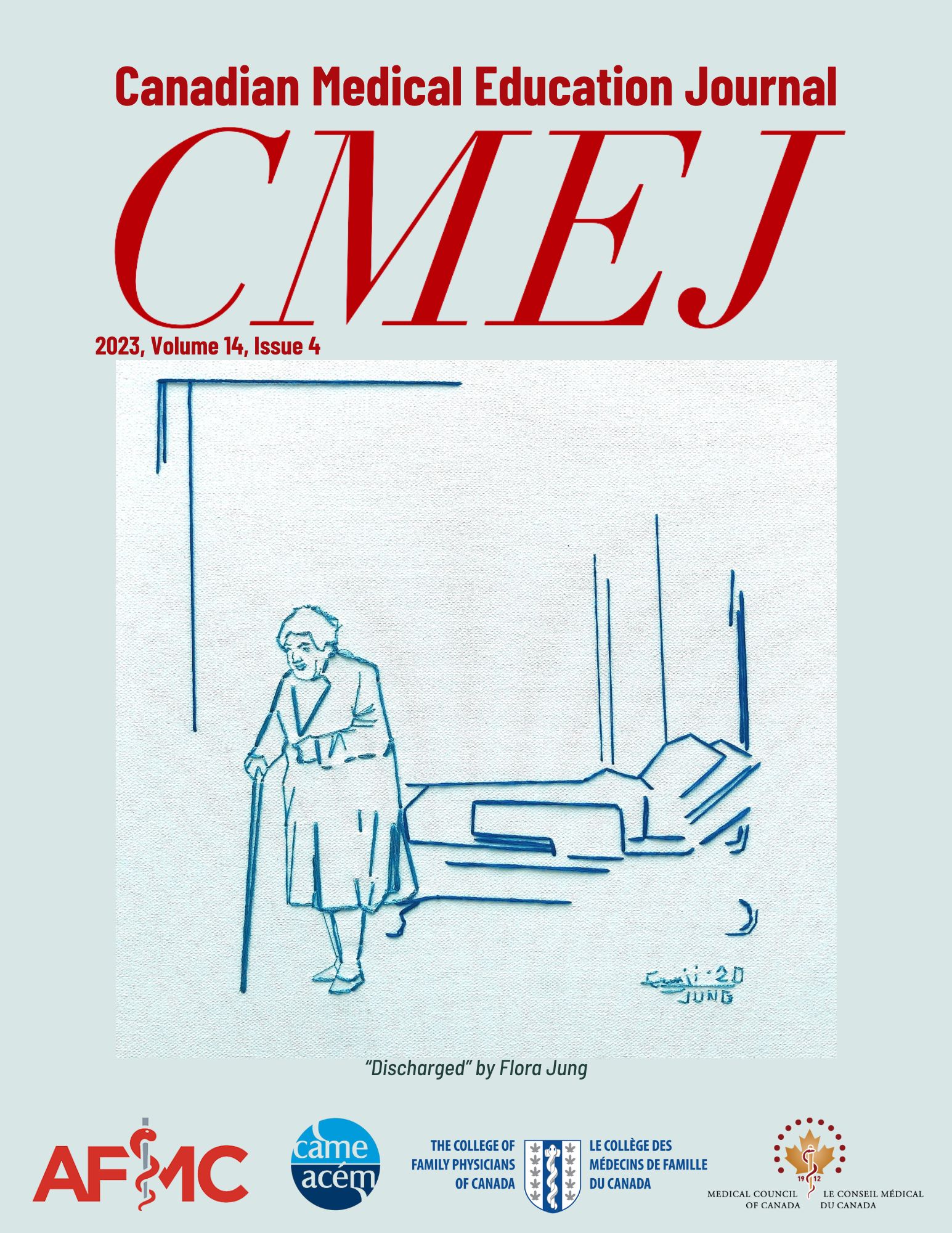A comparative analysis of graduate preparedness for a career in General Internal Medicine before and after national subspecialty recognition to inform curricular changes: have we met the mark?
DOI:
https://doi.org/10.36834/cmej.74949Abstract
Background: A survey of General Internal Medicine (GIM) graduates published in 2006 revealed large training gaps that informed the development of the first national GIM objectives of training in 2010. The first recognized GIM certification examination was written by candidates in 2014. The landscape is again changing with the introduction in 2019 of competency-by-design (CBD) to GIM training. This study aims to examine pre-existing and emerging training gaps with standardization of GIM curricula and identify new training needs to inform CBD curricula.
Methods: GIM graduates from all 16 Canadian programs from 2014 -2019 were emailed a survey modeled after the original study published in 2006. Graduates were asked about their preparedness and importance ratings for various elements of practice.
Results: Many of the previously identified gaps (difference between importance and preparedness ratings) have been resolved in specific clinical areas (obstetrical and perioperative medicine) and skills (exercise stress testing) although some still require ongoing work in areas such as substance use disorders. Importantly, gaps still exist in preparedness for some intrinsic roles (e.g. managerial skills).
Conclusions: The development of a national GIM curriculum has helped close some educational gaps but some still exist. Our study provides data needed to meet the evolving needs of our graduates.
References
Daniels VJ, Kassam N. Determinants of internal medicine residents' choice in the Canadian R4 fellowship match: a qualitative study. BMC Med Educ. 2011. 11, 44. https://doi.org/10.1186/1472-6920-11-44 DOI: https://doi.org/10.1186/1472-6920-11-44
Card SE, Clark HD, Elizov M, Kassam N. The evolution of General Internal Medicine (GIM)in Canada: international implications. J Gen Intern Med. 2017 May;32(5):576-581. https://doi.org/10.1007/s11606-016-3891-z DOI: https://doi.org/10.1007/s11606-016-3891-z
CARMS. CARMS medical subspecialty match reports. Available at https://www.carms.ca/data-reports/msm-data-reports/ [Accessed Feb 22, 2022].
Card SE, Snell L, O’Brien B. Are Canadian general internal medicine training program graduates well prepared for their future careers. BMC Med Educ. 2006; 6(1); 1-9. https://doi.org/10.1186/1472-6920-6-56 DOI: https://doi.org/10.1186/1472-6920-6-56
Royal College of Physicians and Surgeons of Canada. General internal medicine objectives of training in the subspecialty of general internal medicine. Royal College of Physicians and Surgeons of Canada. National Standards for training PRIOR to July 1, 2019. 2012. Available at https://www.royalcollege.ca/rcsite/documents/ibd/general_internal_medicine_otr_e.pdf [Accessed Feb 22, 2022].
Royal College of Physicians and Surgeons of Canada. Competence by Design: Canada’s model of competency-based medical education. Available at https://www.royalcollege.ca/rcsite/cbd/competence-by-design-cbd-e [Accessed Feb 22, 2022].
Cavalcanti RB, Hendricks AC, Card SE. Procedural skills of a General Internist – informed by the front lines. Can J Gen Int Med. 2017. 12(3)8-12. https://doi.org/10.22374/cjgim.v12i3.163 DOI: https://doi.org/10.22374/cjgim.v12i3.163
Card SE, PausJenssen AM, Ottenbreit RC. Determining specific competencies for General Internal Medicine residents (PGY4 and 5). What are they and are programs currently teaching them? A survey of practicing Canadian General Internists. BMC Res Notes. 2011; 4(1): 1–6. https://doi.org/10.1186/1756-0500-4-480 DOI: https://doi.org/10.1186/1756-0500-4-480
Canadian Medical Association. Physician workforce survey: internal medicine. Available at https://www.cma.ca/sites/default/files/2019-01/internal-medicine-e.pdf [Accessed Feb 22, 2022].
Salah HM, Minhas AMK, Khan MS, et al. Causes of hospitalization in the USA between 2005 and 2018. Eur Heart J Open 2021 Jun 15;1(1). https://doi.org/10.1093/ehjopen/oeab001 DOI: https://doi.org/10.1093/ehjopen/oeab001
Canadian Institute for Health Information. Hospital Stays in Canada. 2022. Available at https://www.cihi.ca/en/hospital-stays-in-canada. [Accessed Jan 19, 2023].
Garland EL, Froeliger B, Zeidan F, Partin K, Howard MO. The downward spiral of chronic pain, prescription opioid misuse, and addiction: cognitive, affective, and neuropsychopharmacologic pathways. Neurosci Biobehav Rev. 2013;37(10 0 2):2597-2607. https://doi.org/10.1016/j.neubiorev.2013.08.006 DOI: https://doi.org/10.1016/j.neubiorev.2013.08.006
Ma, I.W.Y., Arishenkoff, S., Wiseman, J. et al. Internal Medicine point-of-care ultrasound curriculum: consensus recommendations from the Canadian Internal Medicine Ultrasound (CIMUS) group. 2017. J Gen Intern Med 32, 1052–1057 https://doi.org/10.1007/s11606-017-4071-5 DOI: https://doi.org/10.1007/s11606-017-4071-5
Frank JR, Snell L, Sherbino J, editors. CanMEDS 2015 Physician Competency Framework. Ottawa: Royal College of Physicians and Surgeons of Canada; 2015. URL: https://www.royalcollege.ca/rcsite/documents/canmeds/canmeds-full-framework-e.pdf [Accessed Mar 8, 2022].
Downloads
Published
Issue
Section
License
Copyright (c) 2023 Samantha Halman, Allen Tran, Tara O'Brien, Sharon Card

This work is licensed under a Creative Commons Attribution-NonCommercial-NoDerivatives 4.0 International License.
Submission of an original manuscript to the Canadian Medical Education Journal will be taken to mean that it represents original work not previously published, that it is not being considered elsewhere for publication. If accepted for publication, it will be published online and it will not be published elsewhere in the same form, for commercial purposes, in any language, without the consent of the publisher.
Authors who publish in the Canadian Medical Education Journal agree to release their articles under the Creative Commons Attribution-Noncommercial-No Derivative Works 4.0 Canada Licence. This licence allows anyone to copy and distribute the article for non-commercial purposes provided that appropriate attribution is given. For details of the rights an author grants users of their work, please see the licence summary and the full licence.











